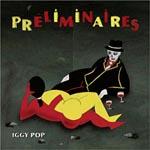
Iggy Pop Préliminaires
(Astralwerks/Virgin)
Initially, this was meant to be a massacre.
As the disappointing thirty-six or so minutes faded after its first go around, Iggy Pop’s latest album, Préliminaires, felt the tired, inoffensive and mediocre byproduct of an aged rocker trapped by his own legacy as one of the most dangerous men to ever front a band or occupy a stage. A supposed deviation from the Pop paradigm, Préliminaires is said to have taken its cue from New Orleans era jazz music (Jelly Roll Morton and Louis Armstrong to be specific) and as having been inspired by French novelist Michel Houellebecq’s book, The Possibility of an Island.
Having said that, Préliminaires doesn’t sound like New Orleans jazz, nor does it feel as if it has a concept to speak of. What I heard was Iggy Pop’s epiphany: That with Ron Asheton gone and The Stooges permanently dissolved, it was time to create an adaptable persona with which he could use to age gracefully while holding on to some fragment of credibility and cultural relevance. As indispensable as Iggy Pop’s influence has been in terms of music, having had a hand in crafting three of the most important albums to ever come in contact with a stylus, (The Stooges, Fun House and Raw Power), his solo work hasn’t yielded much attention for years though he’s tried and tried again. Consider Préliminaires Iggy Pop’s Swordfishtrombones, partly spawned because, in Pop’s own words, “…at one point I just sick of idiot thugs with guitars and, uh, bangin’ out crappy music.” There’s definitely a “mortality” aspect to the album, as The Possibility of an Island deals with the topic extensively and cynically, a song like It’s Nice To Be Dead a less than subtle example of where Pop’s head dwells, how Houellebecq brought him there and how Asheton’s passing didn’t help. Perspective emerged the more I listened to Préliminaires; an understanding of sorts developed. His tired and melancholy declarations of, “I want to go to the beach,” suddenly suggested less a spontaneous daytrip and more a destination for him to live out his remaining years. It also pointed to a desired isolation from the rest of the world.
But, even with the aid of perspective, Préliminaires remains shaky and rushed, not necessarily to the level of half-assed Stooges comeback, The Weirdness, but there’s a degree of resignation that courses through the album. Iggy Pop’s low-register pipes aren’t necessarily new if you’ve ever heard Nightclubbing or Sister Midnight, but Préliminaires carries his croon to Vegan proportions: his tonality that of the self-aware casino performer, content to bark out the hits for his nostalgia-hungry audience without any real emotion or connectivity. A one-time true voice, now a regular at some nightclub, choking through songs amidst second-hand clouds of filtered nicotine.
Iggy’s decision to include standards like Les Feuilles Mortes (Autumn Leaves), (which Edith Piaf made famous), and How Insensitive certainly points to a desired disassociation with his former self, the possibility that he no longer wants to abuse his body to excess for his audiences. At 62 years of age, many almost-fatalities under his belt, his physical being an undoubted and damaged mass of perpetual ache and trauma, you’d be an asshole to blame him.
Still, Pop is sultry and seductive, an aged wisdom exuding macabre romantic passion. His claim on Armstrong is solely exemplified by the two-minute trumpeted ode to canine life, King of the Dogs, and his denial of rock is more or less disproved by the epic pulse of Je Sais Que Tu Sais (reprised later as She’s A Business sans female French dialogue) and the murky pace of It’s Nice To Be Dead. He attempts dance-friendly, plastic modernity with Party Time (“It’s party time/And I smell slime/These stupid people/Make me evil”) and then goes treble blues with He’s Dead/She’s Alive. Less a jazz album than an eclectic selection, Préliminaires is inconsistent and demonstrates Pop’s reluctance to deviate completely from his safety zone.
A Machine For Loving is the album’s most literal adaptation of Houellebecq’s novel, Iggy Pop waxing philosophically about dogs and their capacity for love. “Love is simple to define, but it seldom happens, in the series of beings,” Iggy states, “Through these dogs we pay homage to love, and to its possibility.” Though its mood is based on a fictitious and superficially engaged science fiction landscape, Pop’s appropriation of the material feels personal as he obviously relates to some of Houellebecq’s vision. But, while Préliminaires celebrates dogs, quietly lambastes humanity and acknowledges mortality, Iggy Pop isn’t really doing anything new. His only real creative deviation is that, for the first time, he sounds worn out.
